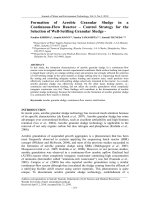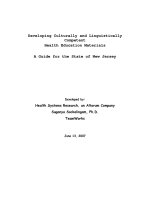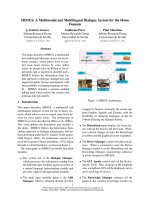Financial Accounting: A comprehensive and practical online guide for the basics of financial accounting docx
Bạn đang xem bản rút gọn của tài liệu. Xem và tải ngay bản đầy đủ của tài liệu tại đây (1.07 MB, 6 trang )
After completing this course you will be conversant with:
Financial Accounting
A comprehensive and practical online guide for the
basics of financial accounting
Accounting Concepts
Accounting Equation
Rules of Accounting
Recording the transactions
Adjusting & Rectifying the books
Preparation of Financial Statements
Analyzing Financial Statements
Reconciling the books
e-learning and reference solutions for the global finance professional
PO Box 910207, San Diego, CA 92191, U.S.A. Ph.: +1-858-558-8118,
Fax: +1-858-558-8448, email:
www.kesdee.com
Overview
Course Level & Number of Courses
Basic & Intermediate Level
Library of 15 Courses
Instructional Method
Dynamic, Interactive e-learning
Recommended Background
Familiarity with basic financial concepts
Target Audience
Every professional involved in the global financial
services industry (as a provider, user, regulator or
advisor of product/services, marketplace/exchange)
would benefit from KESDEE’s innovative solutions.
Supervisory Agencies
Central Banks
Financial Institutions
Commercial Banks
Investment Banks
Housing Societies/Thrifts
Mutual Funds
Brokerage Houses
Stock Exchanges
Derivatives Exchanges
Insurance Companies
Multinational Corporations
Accountancy Firms
Consultancy Firms
Law Firms
Rating Agencies
Multi-lateral Financial Institutions
Others
The themes of this product are:
Any organization that deals with money or money's
worth needs to record every transaction that it enters
into. The courses in this product give a complete
understanding, right from scratch to preparation and
analysis of financial statements. The product is
supplemented with a number of interactive
exercises, in accordance with the 'learn by doing'
approach.
Financial Accounting
Understand the Accounting Framework
Understand the Accounting Process
Understand the process of Finalization
Understand the Financial Statement Analysis
Understand Depreciation Accounting
Understand Merchandise Accounting
Reconciling Cash & Bank balances
Get overall knowledge of Bookkeeping & Accountancy
For more information, please visit:
www.kesdee.com
www.kesdee.com
Time taken to complete each Course: Two - Three hours
Library of 15 Courses
Financial Accounting
For more information, please visit:
www.kesdee.com
1. Introduction to Accounting
Meaning, Functions and Sub fields of Accounting
Accounting Cycle
Accounting Principles- Concepts & Conventions
Accounting Equation
Types of Accounts
Rules of Debit & Credit
2. Accounting Process
Analyzing transactions
Recording transactions
Posting to ledger
Balancing the accounts
Preparing Trial Balance
3. Finalization of Accounts
Rectifying the erroneous entries
Journalizing adjustment entries
Preparing Adjusted Trial Balance
Passing the closing or transfer entries
Preparing financial statements
4. Financial Statement Analysis-I
Categorization of ratios
Various types of ratios including Liquidity Ratios,
Solvency Ratios, Structure Ratios, Leverage Ratios,
and Coverage Ratios.
Significance of these ratios
5. Financial Statement Analysis-II
Various other types of ratios including Profitability
Ratios, Expense Ratios, Turnover Ratios, and
Market Sensitivity Ratios.
Decomposition of ROA and ROE with Dupont Analysis
Limitations of ratio analysis
6. Reconciliation of Books
What actually is Bank Reconciliation?
Reasons for reconciling the books.
Procedure or steps for reconciliation.
7. Petty Cash Accounting
Petty cash and its purpose
Writing petty cash book
Types of petty cash book
Control over petty cash
8. Inventory Accounting
The basics of inventory
Inventory accounting systems
Inventory valuation methods
Accounting for inventory
Inventory and its impact on financial
statements.
9. Depreciation Accounting
The basic concepts of depreciation
The methods of depreciation
Accounting for depreciation
Depreciation and its impact on cash flow
and income tax
The course explains the firm’s decision to
expense or capitalize the costs of acquiring
Further this course discusses the impact of
expensing or capitalizing decision on the
firm’s financial statements and ratios.
The course also explains the treatment for
intangible assets regarding capitalizing or
expensing the costs and describes the
circumstances when intangible assets are
capitalized.
10. Long-Lived Assets - The
Capitalization Decision
Assets.
11. Analysis of Financing Liabilities
The course provides a distinction between
operating and trade debt related to operating
and financing activities.
It explains debt issuance (in particular zero
coupon bond)/amortization effects on
financial statements and financial ratios.
Further, the course analyses the effect of
issuance of a debt with equity features on
financial statements and ratios.
The course gives an insight into various
disclosures related to financing liabilities.
The course also elaborates the effect of
changing interest rates on the market value
of debt as well as on financial statements and
ratios.
Lastly, the course describes the concept of
retiring debt and debt covenants from
various perspectives.
www.kesdee.com
Financial Accounting
For more information, please visit:
www.kesdee.com
12. Leases and Off-Balance-Sheet Debt
The course explains the fundamentals of lease
financing and focuses on various forms of off-
balance-sheet financing.
Further, it differentiates between operating and
financial leases.
It makes the user understand the impact of lease
financing on accounting system of a concern and
its ratios.
The course also expounds the lease accounting
calculations.
Also, it describes various other forms of off-
balance-sheet financing like sales receivables and
take-or-pay contracts.
13. Analysis of Income Taxes
Accounting policies adopted by a company (such
as method of depreciation, valuation of inventories
etc.) influences the financial statements and
thereby the pre-tax income and the income tax
payable. When the tax reporting and financial
reporting differs, it leads to differences in income
and deferred tax liabilities.
The effect on income, deferred tax liability/assets,
and various related issues are discussed in this
course.
14. Financial Reporting Standards
The course discusses the objective of financial
reporting and the importance of financial
standards in security analysis and valuation.
The course explores the role of financial
reporting standard-setting bodies worldwide
and the International Financial Reporting
Standards (IFRS) framework promulgated by
one key body, the International Accounting
Standards Board.
The movement towards worldwide
convergence of financial reporting standards
is also introduced.
Further, IFRS is compared with other
alternative reporting systems.
Finally, the course discusses the importance
of monitoring developments in financial
reporting standards
Time taken to complete each Course: Two - Three hours
Library of 15 Courses
15. International Standards Convergence
The course first explains the major
international accounting standards for each
asset and liability category on the balance
sheet and the key differences from U.S.
generally accepted accounting principles
(GAAP).
Then the course focuses on comparison of
the major international accounting
standards with U.S. GAAP with respect to
major revenue and expense categories on
the income statement.
The course also discusses the major
differences between international and U.S.
GAAP accounting standards concerning the
treatment of interest and dividends on the
cash flow statement.
Finally, the course explains the effect of
differences between international and U.S.
GAAP accounting standards on some
commonly used financial ratios.
Disclosures
Measurement Tools
Case Study
JOB AIDS
Calculators in Financial Accounting
1. Cash Flow Calculator
2. Corporate Performance – Dashboard
3. Ratio Calculator
4. Petty Cash Calculator
5. Bank Reconciliation Calculator
www.kesdee.com
Available Products
For more information, please visit:
www.kesdee.com
KESDEE’s Off-the-Shelf e-Learning Course Libraries
1. Asset Liability Management Library of 28 Courses
2. Liquidity Management and Contingency Funding Plan Library of 14 Courses
3. Financial Institution Analysis - CAMELS Approach Library of 08 Courses
4. Financial Mathematics Library of 07 Courses
5. Global Banking Supervision Library of 15 Courses
6. Capital Adequacy Planning (Basel I) Library of 07 Courses
7. Basel-II-University Library of 63 Courses
8. Operational Risk Management – Basel II Library of 09 Courses
9. Futures and Forwards Library of 07 Courses
10. Swaps Library of 07 Courses
11. Options Library of 10 Courses
12. Market Risk - Basic Library of 08 Courses
13. Market Risk - Intermediate Library of 08 Courses
14. Market Risk - Advanced Library of 04 Courses
15. Value at Risk Library of 16 Courses
16. Credit Analysis Library of 13 Courses
17. Credit Ratings Library of 03 Courses
18. Counter party Credit Risk Library of 09 Courses
19. Credit Risk Modeling Library of 06 Courses
20. Credit Derivatives Library of 23 Courses
21. Operational Risk Management Library of 21 Courses
22. Asset Securitization Library of 28 Courses
23. Asset Liability Management for Insurance Companies Library of 29 Courses
24. Anti-Money Laundering Library of 06 Courses
25. Financial Privacy Library of 06 Courses
26. Corporate Governance Library of 09 Courses
27. Sarbanes-Oxley Act Library of 12 Courses
28. Governance, Risk and Compliance Library of 07 Courses
29. Money Markets Library of 09 Courses
30. Fixed Income Markets Library of 17 Courses
31. Equity Markets Library of 10 Courses
32. Foreign Exchange Markets Library of 09 Courses
33. Commodity and Energy Markets Library of 03 Courses
34. CTM - Foreign Exchange Management Library of 07 Courses
35. CTM - Treasury Analytics Library of 05 Courses
36. CTM - Interest Rate Risk Management Library of 04 Courses
37. CTM - Funding and Investments Library of 05 Courses
38. CTM - Implementation Library of 04 Courses
39. CTM - Case Studies Library of 05 Courses
40. CTM - Trading Operation Controls Library of 04 Courses
41. Understanding Financial Statements Library of 06 Courses
42. Budgeting Library of 05 Courses
43. Management Accounting Library of 07 Courses
44. Financial Accounting Library of 15 Courses
45. Mutual Funds Library of 10 Courses
46. Financial Planning Library of 09 Courses
47. UCP600 Library of 07 Courses
48. International Trade Services Library of 09 Courses
49. BBM - Deposits Library of 04 Courses
50. BBM - Advances Library of 07 Courses
Product Name
No. of Courses
www.kesdee.com
Available Products
For more information, please visit:
www.kesdee.com
Upcoming Products
KESDEE has the required technology platform to respond
to clients training requirements in the banking and
financial services industry. We offer several solutions,
each developed with the guidance of creditable experts.
Given below are few of the forthcoming products:
Agricultural Finance
GFTT
Global Financial Training and Technology
P.O. Box 910207, San Diego, CA 92191-0207, USA.
( +1 858-558-8118
7 +1 858-558-8448
+
,
"
www.kesdee.com,
www.gftt.com
51. BBM - Marketing Library of 03 Courses
52. BBM - Payment and Settlement System Library of 02 Courses
53. BBM - Foreign Exchange Operations Library of 03 Courses
54. BBM - Trade Finance Library of 02 Courses
55. BBM - Book Keeping and accounting Library of 03 Courses
56. BBM - Ancillary Services Library of 02 Courses
57. BBM - Risk Management Library of 03 Courses
58. BBM - Technology and Security Library of 04 Courses
59. BBM - HRM and CSR Library of 02 Courses
60. BBM - Retail Banking Library of 03 Courses
61. Introduction to Bank Lending Environment Library of 07 Courses
62. Basics of Banking Library of 10 Courses
63. Flotation Library of 04 Courses
64. Project Valuation Library of 03 Courses
* CTM: Corporate Treasury Management
* BBM: Bank Branch Management
1. ePRM Coach Library of 69 Courses
2. Associate ePRM Coach Library of 36 Courses
3. eFRM Coach Library of 61 Courses
4. eCoach for the CFA® Program Library of 76 Courses
Product Name
No. of Courses
KESDEE’s Off-the-Shelf e-Learning Course Libraries
Certification Tutorials









